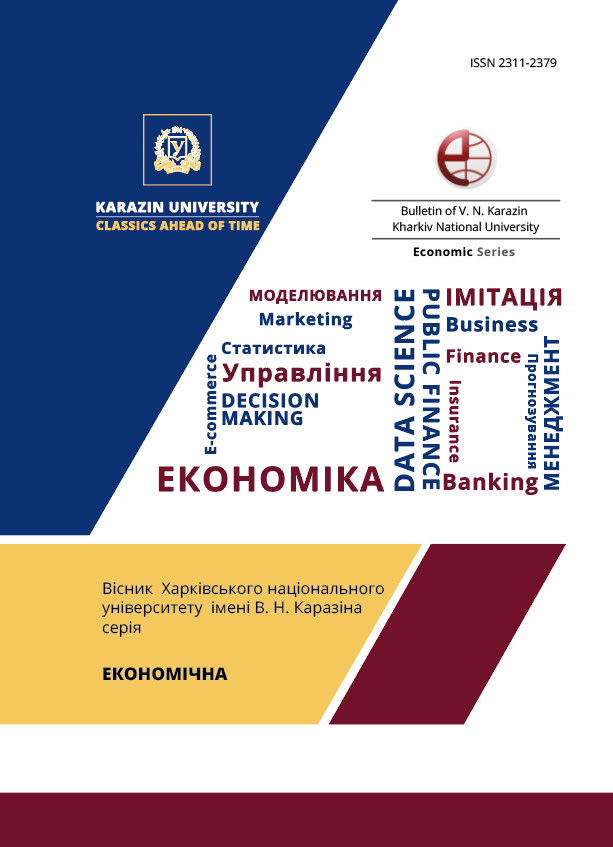Assessment of Ukrainians perceptions toward European Union values: empirical results
Abstract
The paper aims to assess changes in the public perceptions of European Union values in Ukraine in the conditions of external aggression. It explores how conflict escalation affects the public views in different groups, and changes attitudes and beliefs regarding adopting European Union values in society. The paper analyses the concepts of value and demonstrates the devaluation of cultural and social values in some population groups. The methodology applies a survey based on online interviews and descriptive statistics methods. The Schwartz methodology in the World Values Survey 2020 is used to create a survey questionnaire. An online survey of Ukrainians’ worldviews of European Union values perceptions was conducted for Ukrainian citizens in all regions except for the territories, occupied in 2022. The survey results highlight the trend of commitment of a major part of Ukrainian citizens to European Union values. The research demonstrates the inconsistencies in the importance and satisfaction of social values and stereotypes, compliance with the law, personal freedom and human rights, level of economic freedom, and commitment to European integration. These contradictions will be resolved through the development of favorable conditions and of beliefs and convictions of people that support the adoption and dissemination of European values.
Downloads
References
Value, Philosophical Theories of. (2020). New World Encyclopedia. Retrieved from https://www.newworldencyclopedia.org/entry/Value,_Philosophical_theories_of.
Lee, S. M., & Peterson, S. J. (2000). Culture, Entrepreneurial Orientation, and Global Competitiveness. Journal of World Business, 35, 401-416. doi: https://doi.org/10.1016/S1090-9516(00)00045-6.
Young, M. (2022). Less Clash of Civilizations’, more rift. 20.05. Retrieved from https://en.qantara.de/content/ukraine-and-the-wests-selective-values-less-clash-of-civilisatio.
Ukraine in World Values Survey (2020). Resume of the Analytical Report. Kyiv: NGO Ukrainian Centre for European Policy .
Schwartz, S. H. (1992). Universals in the Content and Structure of Values: Theoretical Advances and Empirical Tests in 20 Countries. Advances in Experimental Social Psychology, 25, 1-65.
Verdun, A. (2005). An American-European Divide in European Integration Studies. In the book “The Political Economy of European Integration. Theory and Analysis.” Eds. Erik Jones and Amy Verdun. London and New York: Routledge Taylor & Francis Group.
Tallis, B. (2023). Introduction: Identities, Borders, and Orders in Central and Eastern Europe. In: Identities, Borderscapes, Orders. Frontiers in International Relations. Cham: Springer. doi: https://doi.org/10.1007/978-3-031-23249-7_1.
Dymchenko, O., Rudachenko, O., Yesina, V., & Tararuiev, I. (2021). Economic Potential of Ukraine: Assessment and Forecasting. The 3rd Eastern European Conference of Management and Economics (EECME 2021) – Sustainable Development in Modern Knowledge Society. doi: https://doi.org/10.1051/shsconf/202111101014.
Sologoub, I. (2022). Ukraine’s EU Integration: A Long Way Home. Intereconomics, 57(4), 218-224. doi: https://doi.org/10.1007/s10272-022-1066-1.
Nafus, I. (2018). System of Values as a Basis for Social Capital Formation. Intellect XXI, 1, 179-182.
Gataullin, A., & Lebedev, A. (2011). The Degree of Freedom of Social Subject in the Space of Post-Ideology. Scientific Notes of Kazan University. Humanitarian Sciences, 153(1), 32-41.
Halman, L., Reeskens, T., Sieben, I., Zundert, M. (2022). Atlas of European Values: Change and Continuity in Turbulent Times. Tilburg: Open Press TiU.
Reflections on European Values. (2022). Honouring Lock Halman’s Contribution to the European Values Study. Eds. Ruud Luijkx, Tim Reeskens, Sieben Inge. European Values Series. Publisher: Open Press TiU. doi: https://doi.org/10.26116/09eq-y488.
Reeskens, T. (2022). Are Ukrainian values closer to Russia or Europe? Retrieved from https://blogs.lse.ac.uk/europpblog/2022/03/04/are-ukrainian-values-closer-to-russia-or-to-europe/.
Nosova, O. (2022a). Transformational Change: Challenges and Development Prospects. The Case of Ukraine. Social Entrepreneurship Review, 1. Retrieved from https://ser.uek.krakow.pl/index.php/ser/article/view/79/73.
Social Screening of Ukrainian Society During the Russian Invasion – the Twelfth Way of the Study (2022). Analytical Report. Gradus Research Company. Retrieved from https://gradus.app/en/open-reports/gradus-eu-wave-12-ua/.
Ukrainian Society and European Values (2022). Report on the Results of Sociological Research. Gorshenin Institute. Kyiv: Friedrich Ebert Stiftung.
Nosova, O. (2022b). Transformation of the Social-Economic and Political Values in Ukraine to the European Union Values. Bulletin of V. N. Karazin Kharkiv National University Economic Series, 103, 5-16. doi: https://doi.org/10.26565/2311-2379-2022-103-01.
Nosova, O., Lypov, V. (2022). Cultural Values in the Formation of Economic Relations. London Journal of Social Sciences, 2(4), 20-33. doi: https://doi.org/10.31039/ljss.2022.4.86.
Social Trends 2023 from Gradus Research (2023). Like War Turned Ukrainians Into a More Conscious Nation. Retrieved from https://gradus.app/uk/open-reports/.
War and the Church. Church and Religious Situation in Ukraine in 2022. (2022). Razumkov Center. Retrieved from https://razumkov.org.ua/napriamky/sotsiologichni-doslidzhennia/viina-i-tserkva-tserkovnoreligiina-sytuatsiia-v-ukraini-2022r-lystopad-2022r?fbclid=IwAR1NxjtMmncRIVWv-UoneYZLlu4471nR3kwxAnFCK_JHIWqZPnYhbxxYakg.
The Global Risks Report 2023. 18th Edition. Insight Report. World Economic Forum. Retrieved from https://www.weforum.org/reports/global-risks-report-2023/.
Hrushetsky, A. (2022). How Ukraine Sees the Future in 10 Years and Wiliness’ to Endure Material Difficulties. Press release. Retrieved from https://kiis.com.ua/?lang=ukr&cat=reports&id=1157&page=1.

